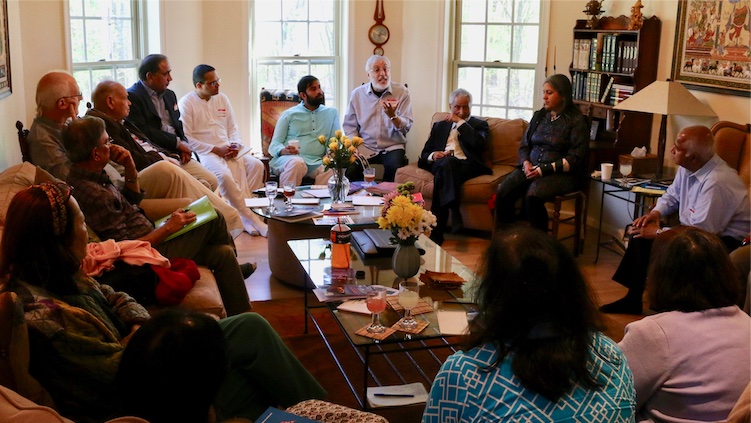Tenth Annual Vaishnava Muslim Dialogue Held in Washington D.C.
By Madhava Smullen | Апр 29, 2019

Muslims and Vaishnavas celebrated the tenth anniversary of their long-running interfaith relationship in Washington D.C. with their tenth annual dialogue in the city on Saturday April 20th.
At each meeting over the past decade, volunteers from each tradition have presented a paper on a chosen topic, one sharing the Vaishnava perspective, and the other the Muslim perspective; followed by an open discussion.
Topics discussed over the years have included “The Name of God”; “What Do I Love When I Love My God?”; “What Do I Do When I Love My God?”; “Sacred Aesthetics”; “The Soul”; and “Inspirations for Peace Building.”
This year’s dialogue was held at the home of founding members and Srila Prabhupada disciples Anuttama Das and Rukmini Dasi, in Silver Spring, Maryland, a D.C. suburb.
The twenty-three participants comprised twelve Vaishnava Hindus and eleven Muslims. The group included several professors from both traditions, as well as leaders of national Muslim and Hindu/Vaishnava organizations in North America.
While many were academics, all were also committed members of their respective faiths. The group was also rather varied, including African American, Anglo American, and South Asian participants, along with college students.
After introductions, papers were presented on this year’s chosen topic, “Attributes of God.” Speaking from the Vaishnava perspective, Bhayahari Das, chairman of the ISKCON of D.C. temple in Potomac, began by explaining how the Supreme Person is “sac-cid-ānanda-vigrahaḥ” – full of eternity, knowledge and bliss.
Quoting the Brahma-samhita, he described how the Lord is the cause of all causes, and has no other cause. He also explained Brahman, Paramatma and Bhagavan – the all-pervasive energy of God, the supersoul or God in the heart, and the Supreme Personality of Godhead.
Next came Abdul Khan, the Muslim representative and a longtime participant in the dialogue. In his deeply philosophical paper, Khan explained how God’s attributes in the Islamic tradition are primarily delineated through His ninety-nine names revealed in the Quran.
These include Ar Raheem, The Most Merciful; Al Khaaliq, The Creator; Al Ghaffaar, The Ever-Forgiving; Al Wali, the Protecting Friend; As Salam, the Ultimate Provider of Peace; Al Alim, The All-Knowing or Omniscient; and Al Aziz, the Almighty, the Self-Sufficient.
After discussing the two presentations, participants broke for a delicious vegetarian lunch. They then continued speaking, with the discussion moving on to challenges each group faces in practicing their faith.
Many members felt that Muslims and Vaishnava Hindus share much in common individually as they try to practice their faith amidst everyday problems. However they expressed their angst at the politicization of religion in the world today and especially the tension being fomented between Hindus and Muslims.
Several older members of the group who had emigrated to America recalled that while growing up in India, both Hindus and Muslims would attend each other’s events. One member spoke about how as a young Muslim, his father would have a brahmana come to teach him the Upanishads in the morning, and later an Imam to teach him the Quaran.
“We all shared stories of the glory days when we were friends with each other, religion was never a wall and we believed Mazhab Nahin sikhata aapas may bair rakhna – religion does not teach one to have ill-will towards the other,” says a Muslim participant who serves as the Executive Director of the Center for Pluralism in Washington, D.C. “In the last few years, the bridge of goodwill is gradually collapsing, and as Lord Krishna says, we have to restore the dharma, the righteousness back again to live without apprehensions and tensions.”
The discussion went on to what everyone could do individually to try to increase understanding, awareness and friendship between Muslims and Hindus in America and around the world.
Ideas included promoting more formal and informal interfaith dialogues. “In light of [the recent terrorist attack] in Sri Lanka, our dialogue is a model to be replicated the world over,” commented a Hindu participant who acts as Director of Government Relations at the Hindu American Foundation.
Another idea was to create programs for youth of both faiths to visit each other’s mosques and temples.
“I think it would be very helpful for ISKCON members in all temples in North America and beyond to organize field trips for middle- and high-school students to visit mosques, churches, and synagogues,” says Anuttama Das. “So that they can learn about other religious traditions, and build friendships with youth of other faiths.”
Anuttama also feels that ISKCON devotees should be leaders in promoting interfaith understanding all around the world, as Srila Prabhupada often taught that all religions should work together to promote God consciousness.
For its part, the Washington D.C. Vaishnava Muslim dialogue has created some deep and true friendships between members over the past decade. Concluding this April’s meeting, there were smiles everywhere, and many participants commented on how much they look forward to the dialogue as a source of spiritual and religious rejuvenation every year.
Next year’s meeting is already being planned, with the topic decided as “Free Will and Destiny.”















